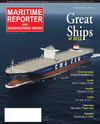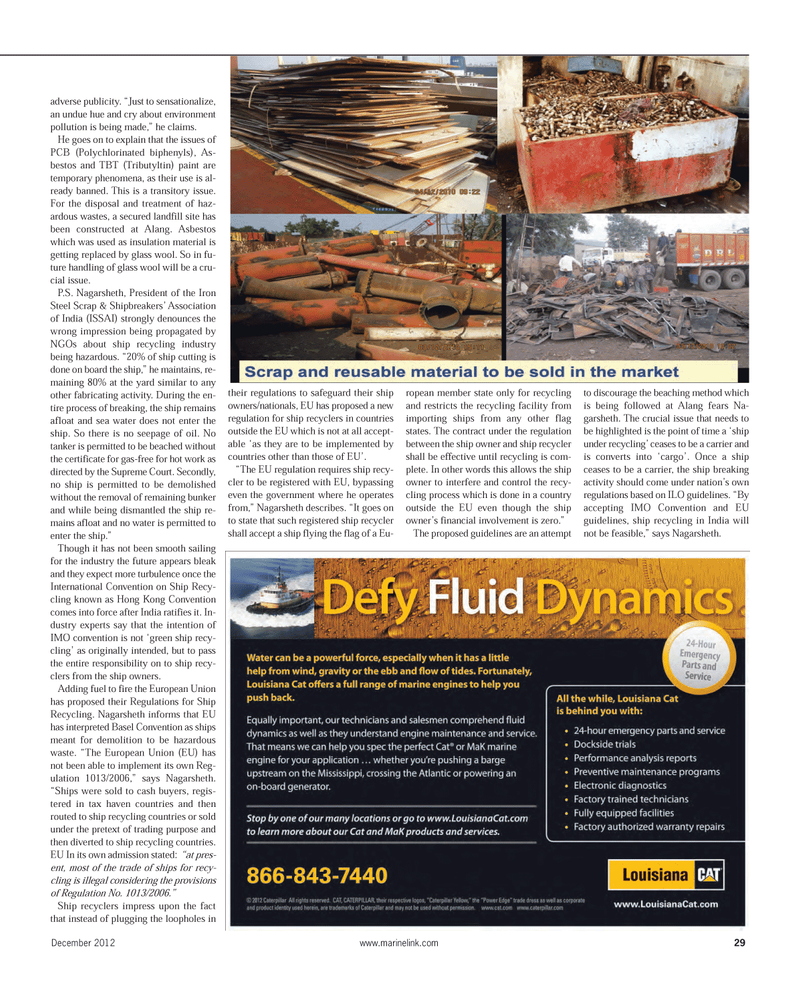
Page 29: of Maritime Reporter Magazine (December 2012)
Great Ships of 2012
Read this page in Pdf, Flash or Html5 edition of December 2012 Maritime Reporter Magazine
adverse publicity. ?Just to sensationalize, an undue hue and cry about environment pollution is being made,? he claims. He goes on to explain that the issues of PCB (Polychlorinated biphenyls), As- bestos and TBT (Tributyltin) paint are temporary phenomena, as their use is al-ready banned. This is a transitory issue. For the disposal and treatment of haz- ardous wastes, a secured landfill site has been constructed at Alang. Asbestos which was used as insulation material is getting replaced by glass wool. So in fu- ture handling of glass wool will be a cru- cial issue. P.S. Nagarsheth, President of the Iron Steel Scrap & Shipbreakers? Association of India (ISSAI) strongly denounces thewrong impression being propagated by NGOs about ship recycling industry being hazardous. ?20% of ship cutting isdone on board the ship,? he maintains, re- maining 80% at the yard similar to any other fabricating activity. During the en- tire process of breaking, the ship remainsafloat and sea water does not enter the ship. So there is no seepage of oil. Notanker is permitted to be beached without the certificate for gas-free for hot work as directed by the Supreme Court. Secondly, no ship is permitted to be demolishedwithout the removal of remaining bunker and while being dismantled the ship re-mains afloat and no water is permitted to enter the ship.? Though it has not been smooth sailingfor the industry the future appears bleakand they expect more turbulence once the International Convention on Ship Recy- cling known as Hong Kong Convention comes into force after India ratifies it. In- dustry experts say that the intention of IMO convention is not ?green ship recy- cling? as originally intended, but to pass the entire responsibility on to ship recy- clers from the ship owners. Adding fuel to fire the European Union has proposed their Regulations for Ship Recycling. Nagarsheth informs that EU has interpreted Basel Convention as ships meant for demolition to be hazardouswaste. ?The European Union (EU) has not been able to implement its own Reg- ulation 1013/2006,? says Nagarsheth. ?Ships were sold to cash buyers, regis- tered in tax haven countries and then routed to ship recycling countries or sold under the pretext of trading purpose and then diverted to ship recycling countries. EU In its own admission stated: ?at pres- ent, most of the trade of ships for recy- cling is illegal considering the provisions of Regulation No. 1013/2006.? Ship recyclers impress upon the fact that instead of plugging the loopholes intheir regulations to safeguard their ship owners/nationals, EU has proposed a new regulation for ship recyclers in countries outside the EU which is not at all accept-able ?as they are to be implemented by countries other than those of EU?. ?The EU regulation requires ship recy- cler to be registered with EU, bypassing even the government where he operates from,? Nagarsheth describes. ?It goes on to state that such registered ship recycler shall accept a ship flying the flag of a Eu-ropean member state only for recycling and restricts the recycling facility from importing ships from any other flag states. The contract under the regulation between the ship owner and ship recycler shall be effective until recycling is com- plete. In other words this allows the ship owner to interfere and control the recy- cling process which is done in a countryoutside the EU even though the ship owner?s financial involvement is zero.? The proposed guidelines are an attemptto discourage the beaching method whichis being followed at Alang fears Na- garsheth. The crucial issue that needs to be highlighted is the point of time a ?shipunder recycling? ceases to be a carrier and is converts into ?cargo?. Once a ship ceases to be a carrier, the ship breaking activity should come under nation?s own regulations based on ILO guidelines. ?By accepting IMO Convention and EU guidelines, ship recycling in India will not be feasible,? says Nagarsheth. December 2012www.marinelink.com 29MR#12 (26-33):MR Template 12/3/2012 2:26 PM Page 29

 28
28

 30
30
